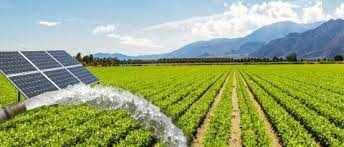As the world wrestles with the double difficulties of food security and natural supportability, the job of environmentally friendly power sources in agribusiness has become progressively urgent. Solar energy has arisen as a unique advantage for sustainable cultivating rehearses. By using the bountiful and clean force of the sun, ranchers can diminish their dependence on petroleum products, lower working expenses, and relieve the natural effect of conventional cultivating techniques. This article investigates the idea of Benedict t palen Jr diverse connection between solar energy and sustainable farming, featuring its advantages and applications in the farming area.
the on-farm solar power generator
Establishing solar energy chargers on
rural land offers ranchers a reasonable answer for the on-location power age.
With photovoltaic (PV) frameworks, solar energy-based energy can be changed
into power over completely to meet different homestead energy needs. Solar
energy sunlight-based chargers can drive water system frameworks, lighting,
apparatus, and other ranch activities, decreasing reliance on
non-environmentally friendly power sources and limiting ozone-depleting
substance discharges. This approach not just gives a reliable and clean energy
source but also lessens service bills and upgrades the monetary reasonability
of cultivating tasks.
The off-grid solar panel
Solar energy can be an extraordinary
arrangement in remote or off-lattice regions where admittance to power is
restricted. Off-matrix planetary groups, outfitted with batteries for energy
capacity, can give a solid and economic power hotspot for cultivating networks.
This innovation empowers ranchers to work essential gear, for example,
refrigeration for food capacity, water siphons for water systems, and lighting
for broadened working hours. By embracing off-lattice solar energy
arrangements, ranchers can upgrade efficiency, expand crop period of usability,
and work on their general vocations.
Solar energy-enhanced pumped water.
Water shortage is a central issue for
ranchers around the world. Sun energy-fuelled siphoning water frameworks offer
a successful and practical answer for addressing this test. These frameworks
utilize sun-powered energy to control water siphons, removing the requirement for
petroleum derivatives to assemble siphons or dependence on lattice power. Solar
energy siphons give ranchers a savvy and eco-accommodating technique for
flooding crops, especially in regions with problematic or costly power
supplies. By saddling solar energy, ranchers can upgrade crop yields, advance
water utilization, and advance water protection.
Renewable energy crop drying processes
Solar energy can likewise be bridled for
crop drying and handling, diminishing post-harvest losses and further developing
food quality. Solar energy-powered dryers use the sun's intensity to eliminate
dampness from agricultural produce, improving the timeframe of realistic
usability and forestalling waste. This technique is especially advantageous in
districts with high mugginess or restricted admittance to power. Moreover,
sunlight-based fuelled factories and handling units can crush grains, process
oilseeds, and produce biofuels, broadening pay sources and decreasing
dependence on regular energy-serious cycles.
Benefits of carbon footprinting

No comments:
Post a Comment